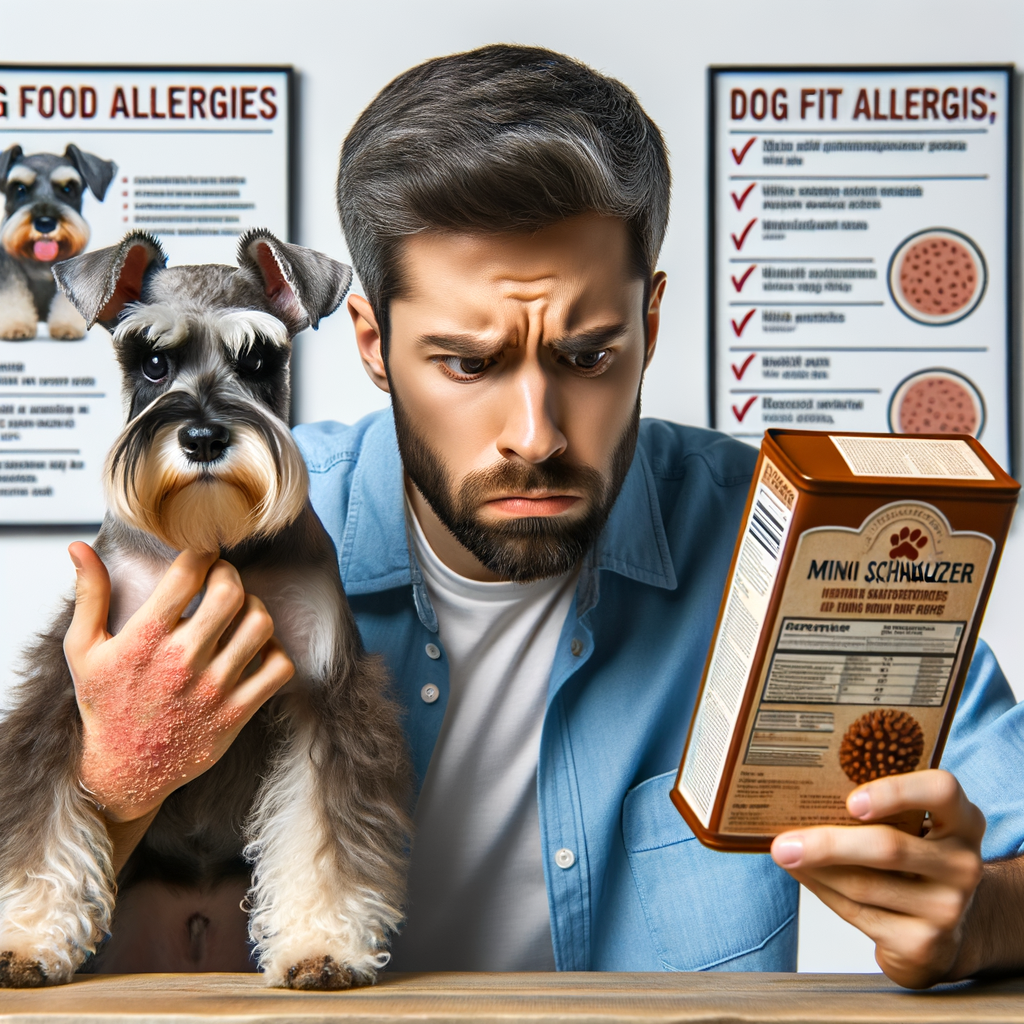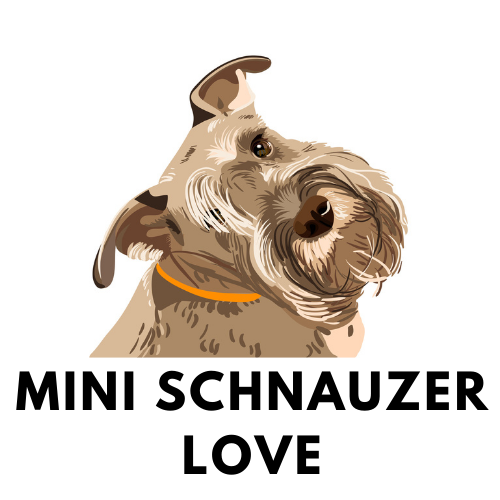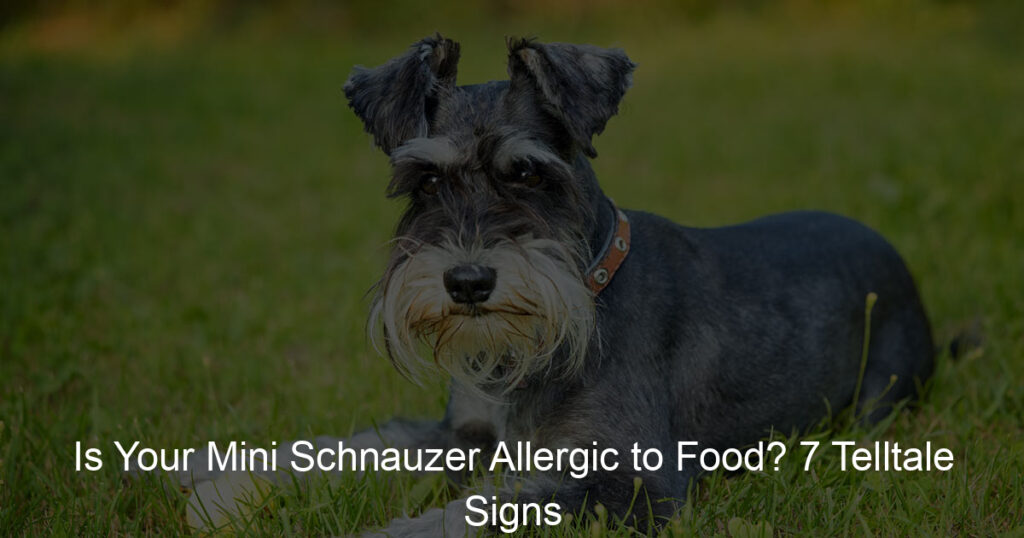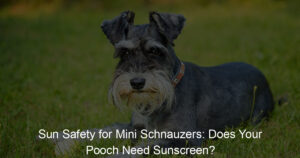
Introduction to Mini Schnauzer Food Allergies
As a Mini Schnauzer owner, it’s important to understand the potential health issues your pet can face. One such issue is food allergies. In this article, we’ll delve into what food allergies in dogs are, with a specific focus on Mini Schnauzers.
- Overview of food allergies in dogs
- Specifics of Mini Schnauzer food allergies
Food allergies in dogs are an abnormal response to a particular food or ingredient. This reaction is triggered by the dog’s immune system. It’s estimated that food allergies account for about 10% of all allergies in dogs. Common symptoms include itching, redness, and gastrointestinal problems like diarrhea and vomiting.
Mini Schnauzers, like other breeds, can develop food allergies. However, they are more prone to certain types of food allergies. For instance, Mini Schnauzers are often allergic to beef, dairy, wheat, and chicken. These allergies can develop at any age, but they are most commonly noticed when the dog is young.
Understanding your Mini Schnauzer’s food allergies is crucial to ensuring their health and happiness. In the following sections, we’ll explore how to identify food allergies, share some case studies of Mini Schnauzers with food allergies, and provide tips on managing these allergies.
Understanding Food Allergies in Dogs
Food allergies in dogs can be a serious concern for pet owners. Understanding what they are and what causes them can help you keep your furry friend healthy and happy.
What are Food Allergies?
Food allergies are a type of adverse food reaction that occurs when a dog’s immune system mistakenly identifies a particular food ingredient as harmful. This triggers a series of reactions in the dog’s body, which can lead to various symptoms.
- Definition and explanation of food allergies: A food allergy is an immune response to a food protein that the body mistakenly identifies as a threat. When a dog eats a food containing this protein, the immune system launches an attack, leading to allergy symptoms. These symptoms can range from mild, such as itching and skin irritation, to severe, including vomiting, diarrhea, and even anaphylaxis, a potentially life-threatening condition.
- Common allergens for dogs: The most common food allergens for dogs include beef, dairy, wheat, egg, chicken, lamb, soy, pork, rabbit, and fish. However, any food can potentially cause an allergy. It’s important to note that food allergies are different from food intolerances, which do not involve an immune response and are typically less severe.
Understanding food allergies in dogs is the first step towards managing them. If you suspect your dog may have a food allergy, it’s important to consult with a veterinarian for a proper diagnosis and treatment plan.
How Common are Food Allergies in Mini Schnauzers?
Food allergies are a common concern for many pet owners, and Mini Schnauzers are no exception. Let’s delve into the statistics and see how they compare to other breeds.
- Statistics on Mini Schnauzer Food Allergies
According to a study conducted by the American Kennel Club, approximately 10% of Mini Schnauzers suffer from food allergies. This is a significant number considering the overall population of this breed. Food allergies in Mini Schnauzers can manifest in various ways, including skin irritations, digestive issues, and even behavioral changes.
| Food Allergy Symptoms | Percentage of Mini Schnauzers Affected |
|---|---|
| Skin Irritations | 60% |
| Digestive Issues | 30% |
| Behavioral Changes | 10% |
- Comparison with Other Breeds
When compared to other breeds, Mini Schnauzers fall in the middle range for food allergy prevalence. For instance, breeds like the Cocker Spaniel and the German Shepherd tend to have a higher incidence of food allergies, at around 15% and 20% respectively. On the other hand, breeds like the Beagle and the Dachshund have a lower incidence, at around 5%.
It’s important to note that these statistics don’t necessarily mean that Mini Schnauzers are more or less prone to food allergies. Many factors can contribute to the development of food allergies, including genetics, environment, and diet. Therefore, it’s essential to monitor your Mini Schnauzer’s health and consult with a veterinarian if you notice any signs of food allergies.
Identifying Dog Food Allergies: The 7 Telltale Signs
Recognizing the symptoms of food allergies in your Mini Schnauzer is the first step towards ensuring their health and happiness. Let’s dive into the first telltale sign.
Sign 1: Skin Irritations
Food allergies can often manifest as skin problems in dogs, particularly in Mini Schnauzers. This is because the immune system reacts to certain food proteins as if they were harmful invaders, leading to inflammation and irritation on the skin.
- Explanation of how food allergies can cause skin problems
- Specific symptoms to look for in Mini Schnauzers
- Excessive scratching, licking, or chewing at the skin
- Red, inflamed skin
- Hives or skin rashes
- Sores and scabs from scratching
- Chronic ear infections
When a Mini Schnauzer consumes a food it’s allergic to, the body’s immune response can cause an increase in histamine production. Histamine is a compound that the body releases when it’s under attack. In the case of a food allergy, this “attack” is actually harmless food protein. The excess histamine can lead to various skin problems such as itching, redness, and swelling.
Mini Schnauzers with food allergies may exhibit several skin-related symptoms. These can include:
If you notice any of these symptoms in your Mini Schnauzer, it’s important to consult with a veterinarian. They can help determine if a food allergy is the cause and guide you on the best course of action.
Sign 2: Digestive Issues
When a Mini Schnauzer has a food allergy, it can lead to a variety of digestive problems. Understanding these issues can help you identify whether your pet may be suffering from a food allergy.
- How food allergies can affect a Mini Schnauzer’s digestive system
- Specific symptoms to look for
Food allergies in Mini Schnauzers can cause inflammation in the digestive tract. This inflammation can lead to a range of symptoms. For instance, your dog may experience discomfort or pain in their stomach. They may also have difficulty digesting their food properly, which can lead to malnutrition over time.
It’s important to remember that each dog is unique. Some Mini Schnauzers may show clear signs of digestive issues, while others may not show any symptoms at all. This is why it’s crucial to pay close attention to your dog’s behavior and health.
There are several key symptoms to watch out for if you suspect your Mini Schnauzer may have a food allergy. These include:
| Symptom | Description |
|---|---|
| Vomiting | If your dog is throwing up more than usual, it could be a sign of a food allergy. |
| Diarrhea | Loose or watery stools can indicate that your dog’s digestive system is upset. |
| Excessive gas | While it’s normal for dogs to pass gas, excessive gas could be a sign of a food allergy. |
| Loss of appetite | If your dog is refusing to eat or is eating less than usual, it could be because their food is causing them discomfort. |
If you notice any of these symptoms, it’s important to take your Mini Schnauzer to the vet as soon as possible. They can perform tests to determine whether a food allergy is the cause of your dog’s digestive issues.
Case Studies: Mini Schnauzers with Food Allergies
Let’s take a closer look at two real-life examples of Mini Schnauzers who have struggled with food allergies. These case studies will help us understand the signs, symptoms, and management strategies for these common allergies.
-
Case Study 1: Mini Schnauzer with a Wheat Allergy
Meet Max, a lively Mini Schnauzer who started showing signs of discomfort after meal times. His owner noticed that Max was scratching more than usual, had red and irritated skin, and was suffering from frequent ear infections. A visit to the vet and subsequent allergy test revealed that Max was allergic to wheat, a common ingredient in many dog foods.
Max’s owner switched him to a wheat-free diet, and the change was remarkable. Max’s skin cleared up, the ear infections stopped, and he was back to his energetic self. This case highlights the importance of identifying and addressing food allergies in our furry friends.
-
Case Study 2: Mini Schnauzer with a Dairy Allergy
Next, we have Bella, a sweet Mini Schnauzer who loved her daily serving of cottage cheese. However, Bella’s owner noticed that she was often bloated, had frequent bouts of diarrhea, and was lethargic. A trip to the vet and an allergy test confirmed that Bella was lactose intolerant, meaning she was allergic to dairy products.
Once Bella’s owner removed dairy from her diet, Bella’s digestive issues resolved, and she was back to her playful self. This case underscores the fact that even foods we consider ‘treats’ can be harmful if our pets are allergic to them.
These case studies serve as a reminder that food allergies in Mini Schnauzers, as in all dogs, can significantly impact their quality of life. It’s crucial to monitor our pets for any signs of discomfort or changes in behavior, particularly after meals. If you notice anything out of the ordinary, a trip to the vet is always a good idea.
Managing Mini Schnauzer Allergy Symptoms
When your Mini Schnauzer is suffering from food allergies, it can be a stressful time for both you and your pet. However, by making some changes to their diet, you can help manage their symptoms and improve their overall health.
Changing Your Mini Schnauzer’s Diet
One of the most effective ways to manage food allergies in Mini Schnauzers is by modifying their diet. This can be a powerful tool in reducing symptoms and promoting overall health.
- How diet changes can help manage food allergies
- Recommended diets for Mini Schnauzers with food allergies
Food allergies in Mini Schnauzers can be triggered by certain ingredients in their diet. By identifying and eliminating these triggers, you can significantly reduce their allergy symptoms. This often involves a process of elimination, where you gradually remove potential allergens from their diet and monitor their reaction. It’s important to remember that this should be done under the guidance of a vet to ensure your pet is still getting all the nutrients they need.
There are several diets that have been shown to be beneficial for Mini Schnauzers with food allergies. These include hypoallergenic diets, which are designed to minimize the risk of an allergic reaction, and limited ingredient diets, which contain fewer components and therefore fewer potential allergens. Some Mini Schnauzers may also benefit from a grain-free diet, as grains are a common allergen for many dogs. However, it’s important to consult with your vet before making any major changes to your pet’s diet.
In conclusion, changing your Mini Schnauzer’s diet can be an effective way to manage their food allergy symptoms. However, it’s important to do this under the guidance of a vet to ensure they’re still getting all the nutrients they need. With the right diet, your Mini Schnauzer can lead a happy and healthy life, free from the discomfort of food allergies.
Medical Treatments for Mini Schnauzer Food Allergies
When it comes to your Mini Schnauzer’s health, understanding the available medical treatments for food allergies is crucial. Let’s delve into the various options and learn when it’s time to consult a vet.
- Overview of medical treatments available
- Antihistamines: These can help to reduce itching, swelling, and other allergic reactions.
- Corticosteroids: These are often used to treat severe allergic reactions. They can help to reduce inflammation and other symptoms.
- Immunotherapy: This involves exposing your Mini Schnauzer to small amounts of the allergen, in an attempt to desensitize their immune system.
- Prescription Diets: Special diets can be prescribed by your vet, which are designed to avoid the allergens causing the reactions.
- When to consult a vet
There are several medical treatments available for Mini Schnauzers suffering from food allergies. These include:
Remember, each dog is unique and what works for one might not work for another. It’s essential to work closely with your vet to find the best treatment plan for your Mini Schnauzer.
If your Mini Schnauzer is showing signs of a food allergy, such as itching, digestive issues, or changes in behavior, it’s time to consult a vet. It’s important to get a professional diagnosis to ensure your pet gets the right treatment. Also, if your dog is on a treatment plan but the symptoms persist or worsen, you should immediately contact your vet.
In conclusion, managing Mini Schnauzer food allergies involves understanding the available treatments and knowing when to seek professional help. With the right approach, your Mini Schnauzer can lead a happy, healthy life despite their food allergies.
Conclusion: Keeping Your Mini Schnauzer Healthy
As we wrap up this comprehensive guide on Mini Schnauzer health, it’s crucial to remember that maintaining your pet’s health is a continuous process. Let’s recap some of the key points we’ve covered.
- Recap of signs of dog food allergies
- Final thoughts on managing Mini Schnauzer health issues
Understanding the signs of dog food allergies is the first step towards ensuring your Mini Schnauzer’s health. These signs can range from skin irritations, gastrointestinal issues, chronic ear infections, to excessive grooming. Remember, early detection is key to managing these allergies effectively.
Managing your Mini Schnauzer’s health issues doesn’t have to be a daunting task. With the right diet, regular vet check-ups, and a keen eye for any changes in your pet’s behavior, you can ensure your Mini Schnauzer leads a healthy and happy life. Remember, your Mini Schnauzer’s health is a reflection of the care and love you provide.
In conclusion, your Mini Schnauzer’s health should always be a top priority. By understanding the signs of food allergies and knowing how to manage them, you can ensure your pet lives a long, healthy, and happy life. Keep in mind that every dog is unique, and what works for one might not work for another. Therefore, always consult with your vet before making any significant changes to your pet’s diet or lifestyle.














